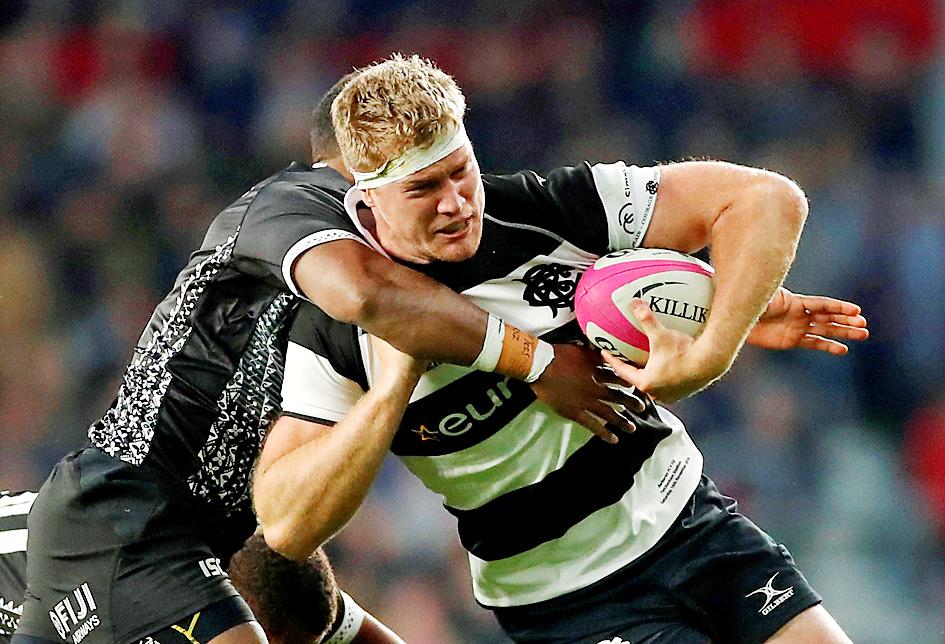A sudden shortage of locks in Australian rugby union has opened the door for Matt Philip to reclaim his Wallabies jersey, but the Melbourne Rebels player says that the uncertainties wrought by the COVID-19 pandemic have left him with a difficult choice.
The Australian yesterday named Philip among 16 Rebels players either set to leave the Super Rugby club or seriously considering it, underscoring the challenge Rugby Australia faces to retain talent.
Linked with a move to Section Paloise Bearn Pyrenees, commonly referred to as Pau, in France’s Top 14, Philip said that he had yet to settle his playing future, and that his decision could come down to a mental tug-of-war between a Wallabies jersey and the security of a European contract.

Photo: Reuters
“I’ve been speaking to some European clubs — it’s just talks at the moment and I’m still just focusing on what’s in front of me at the Rebels,” the 26-year-old, who won three caps for Australia in 2017, said in an interview. “It’s an exciting thing about rugby, you do get these opportunities overseas, but at the same time I’ve grown up here loving the Wallabies, so it’s not the easiest thing in the world. A lot of thought will have to go into it.”
Should Philip decide his future lies outside Australia, it would add to incoming Wallabies coach Dave Rennie’s problems in the second row.
Wallabies lock Izack Rodda and two of his Queensland Reds teammates terminated their contracts after refusing to take pay cuts agreed by Rugby Australia and the players’ union.
One of the other Queensland rebels, Harry Hockings, is a towering 21-year-old lock seen as having a big Wallabies future.
Both are expected to move abroad and be unavailable for selection for the Wallabies, whose second-row stocks were already looking thin.
The trio were pilloried by former players and pundits for “deserting” Australia in its time of need, but Philip said no one had the right to judge given the uncertainties facing the domestic game.
Super Rugby was suspended in March and is highly unlikely to resume this year due to travel curbs and border controls, leaving the nation’s players with little security about their long-term pay.
“People don’t understand others’ circumstances and it’s been a tough period for everyone,” Philip said. “At the end of the day, rugby is still a business and in the business world — not that I’ve had much to do with it — this happens all the time.”
Rugby is nearing a return in Australia in a domestic tournament featuring the nation’s four Super Rugby teams plus Perth-based Western Force.
Philip was in good form for the Rebels before the season was suspended and hopes to pick up where he left off when the domestic tournament begins.
While he relishes the home derbies, like other local players he thinks that Super Rugby, with its long-haul trips to South Africa, Argentina and Japan, has passed its shelf life.
“Something needs to happen, I’m not the guy to tell you what that is, but something does need to change to help rugby thrive again in Australia — like it should be,” Philip said.

Shohei Ohtani and Clayton Kershaw on Friday joined their Los Angeles Dodgers teammates in sticking their fists out to show off their glittering World Series rings at a ceremony. “There’s just a lot of excitement, probably more than I can ever recall with the Dodger fan base and our players,” manager Dave Roberts said before Los Angeles rallied to beat the Detroit Tigers 8-5 in 10 innings. “What a way to cap off the first two days of celebrations,” Roberts said afterward. “By far the best opening week I’ve ever experienced. I just couldn’t have scripted it any better.” A choir in the

After fleeing Sudan when civil war erupted, Al-Hilal captain Mohamed Abdelrahman and his teammates have defied the odds to reach the CAF Champions League quarter-finals. They are today to face title-holders Al-Ahly of Egypt in Cairo, with the return match in the Mauritanian capital, Nouakchott, on Tuesday next week. Al-Hilal and biggest domestic rivals Al-Merrikh relocated to Mauritania after a power struggle broke out in April 2023 between the Sudanese army and a paramilitary force. The civil war has claimed tens of thousands of lives and displaced more than 12 million people, according to the UN. The Democratic Republic of the Congo-born Al-Hilal

Shohei Ohtani, Teoscar Hernandez and Tommy Edman on Thursday smashed home runs to give the reigning World Series champions the Los Angeles Dodgers a 5-4 victory over Detroit on the MLB’s opening day in the US. The Dodgers, who won two season-opening games in Tokyo last week, raised their championship banner on a day when 28 clubs launched the season in the US. Dodgers manager Dave Roberts shuffled his batting lineup with all four leadoff hitters finally healthy as Ohtani was followed by Mookie Betts, then Hernandez and Freddie Freeman in the cleanup spot, switching places with Hernandez. “There’s a Teoscar tax to

Matvei Michkov did not score on Monday, but the Philadelphia rookie had a hand in both goals as hosts the Flyers earned a 2-1 victory over the Nashville Predators. Ryan Poehling and Jamie Drysdale got the goals for the Flyers (31-36-9, 71 points), who won their third straight. Michkov and Travis Konecny assisted on both. Ivan Fedotov stopped 28 shots to earn his first win since March 1, ending a personal six-game losing streak. Zachary L’Heureux got the lone goal for Nashville. Michael McCarron and Brady Skjei got the assists for the Predators (27-39-8, 62 points), who have just four goals in their